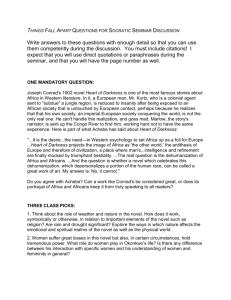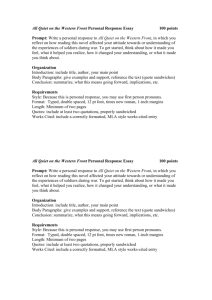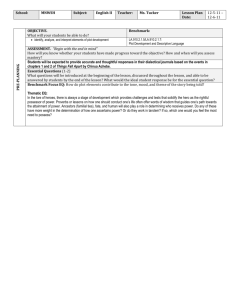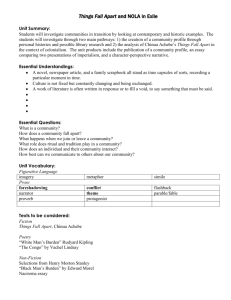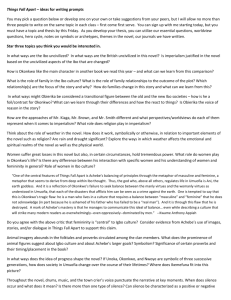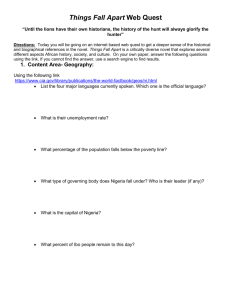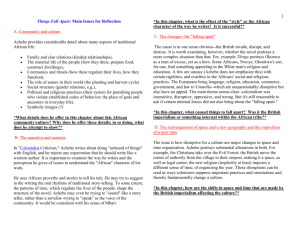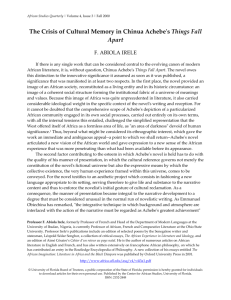Things Fall Apart Reflection Questions - Jones College Prep
advertisement
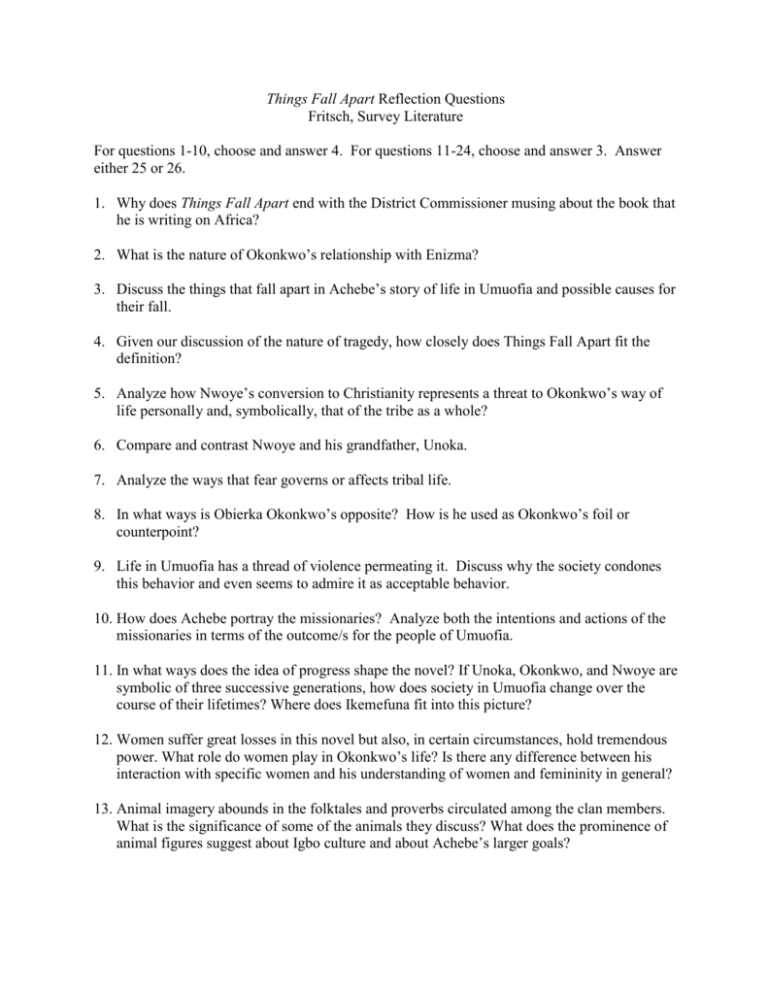
Things Fall Apart Reflection Questions Fritsch, Survey Literature For questions 1-10, choose and answer 4. For questions 11-24, choose and answer 3. Answer either 25 or 26. 1. Why does Things Fall Apart end with the District Commissioner musing about the book that he is writing on Africa? 2. What is the nature of Okonkwo’s relationship with Enizma? 3. Discuss the things that fall apart in Achebe’s story of life in Umuofia and possible causes for their fall. 4. Given our discussion of the nature of tragedy, how closely does Things Fall Apart fit the definition? 5. Analyze how Nwoye’s conversion to Christianity represents a threat to Okonkwo’s way of life personally and, symbolically, that of the tribe as a whole? 6. Compare and contrast Nwoye and his grandfather, Unoka. 7. Analyze the ways that fear governs or affects tribal life. 8. In what ways is Obierka Okonkwo’s opposite? How is he used as Okonkwo’s foil or counterpoint? 9. Life in Umuofia has a thread of violence permeating it. Discuss why the society condones this behavior and even seems to admire it as acceptable behavior. 10. How does Achebe portray the missionaries? Analyze both the intentions and actions of the missionaries in terms of the outcome/s for the people of Umuofia. 11. In what ways does the idea of progress shape the novel? If Unoka, Okonkwo, and Nwoye are symbolic of three successive generations, how does society in Umuofia change over the course of their lifetimes? Where does Ikemefuna fit into this picture? 12. Women suffer great losses in this novel but also, in certain circumstances, hold tremendous power. What role do women play in Okonkwo’s life? Is there any difference between his interaction with specific women and his understanding of women and femininity in general? 13. Animal imagery abounds in the folktales and proverbs circulated among the clan members. What is the significance of some of the animals they discuss? What does the prominence of animal figures suggest about Igbo culture and about Achebe’s larger goals? 14. Throughout the novel, drums, music, and the town crier’s voice punctuate the narrative at key moments. When does silence occur and what does it mean? Is there more than one type of silence? Can silence be characterized as a positive or negative occurrence? What are the implications of the fact that Unoka takes his flute with him to the Evil Forest when he dies? 15. Think about the role of weather in the novel. How does it work, symbolically or otherwise, in relation to important elements of the novel such as religion? Are rain and draught significant? Explore the ways in which weather affects the emotional and spiritual realms of the novel as well as the physical world. 16. Make a list of the incidents that foreshadow the demise of Okonkwo and the Ibo tribe. Explain what you believe is the effect of the foreshadowing on the reader’s interpretation of events. 17. Analyze the relationship between men and women in the African culture as Achebe presents it. Explain how this relationship is similar or dissimilar to the Western view of the relationships between men and women. Focus on both the positive and negative aspects of the relationship. What comment is Achebe trying to make about the dynamics of the relationship in his culture? 18. Achebe’s representation of his African heritage is aimed directly at the Western reader. How do you believe Achebe wants the reader to see Africa after reading this novel? What techniques does Achebe use that are most successful? Which techniques does he use that are the least successful? 19. How does Achebe illustrate the African culture? What stereotypes do you think he is trying to erase? What stereotypes do you think he validates? 20. Ikemefuna is introduced and killed early in the novel. What is his role in the plot of the novel as well as in the character development? 21. Discuss the ways in which Things Fall Apart functions as a tragedy. 22. Discuss the different points of view that are present throughout the novel. Why does Achebe choose to use different points of view? What is the effect on the reader? 23. Discuss the role of fate, or “chi,” in the novel. How do you think Achebe feels about fate versus a person’s control over his or her own destiny? 24. How does the last chapter of the book differ from the other chapters? Why do you think Achebe chooses to narrate the last chapter from the point of view of someone who has yet to be introduced in the novel? 25. Chinua Achebe has written extensively about his own life and works. Below is an excerpt from an essay in which he discusses why he wrote Things Fall Apart: This theme—put quite simply—is that African people did not hear of culture for the first time from Europeans; that their societies were not mindless but frequently had a philosophy of great depth and value and beauty, that they had poetry and, above all, they had dignity. It is this dignity that many African people all but lost during the colonial period and it is this that they must now regain. The worst thing that can happen to any people is the loss of their dignity and self-respect. The writer’s duty is to help them regain it by showing them in human terms what happened to them, what they lost. From “The Role of the Writer in a New Nation,” 1964. Discuss how well Things Fall Apart manages to accomplish the above-stated goal. What “depth, value, and beauty” does Achebe depict in the Ibo people? How does he depict them as human, with human dignity and human failings? 26. The title of this novel alludes to one of the themes present in the novel. Read the poem “The Second Coming” by William Butler Yeats. Note how the theme of the poem is developed throughout the story. Explain how the title relates to key scenes and how it functions as a theme. The Second Coming William Butler Yeats (1865-1939) Turning and turning in the widening gyre The falcon cannot hear the falconer; Things fall apart; the centre cannot hold; Mere anarchy is loosed upon the world, The blood-dimmed tide is loosed, and everywhere The ceremony of innocence is drowned; The best lack all conviction, while the worst Are full of passionate intensity. Surely some revelation is at hand; Surely the Second Coming is at hand. The Second Coming! Hardly are those words out When a vast image out of Spiritus Mundi Troubles my sight: a waste of desert sand; A shape with lion body and the head of a man, A gaze blank and pitiless as the sun, Is moving its slow thighs, while all about it Wind shadows of the indignant desert birds. The darkness drops again but now I know That twenty centuries of stony sleep Were vexed to nightmare by a rocking cradle, And what rough beast, its hour come round at last, Slouches towards Bethlehem to be born?
